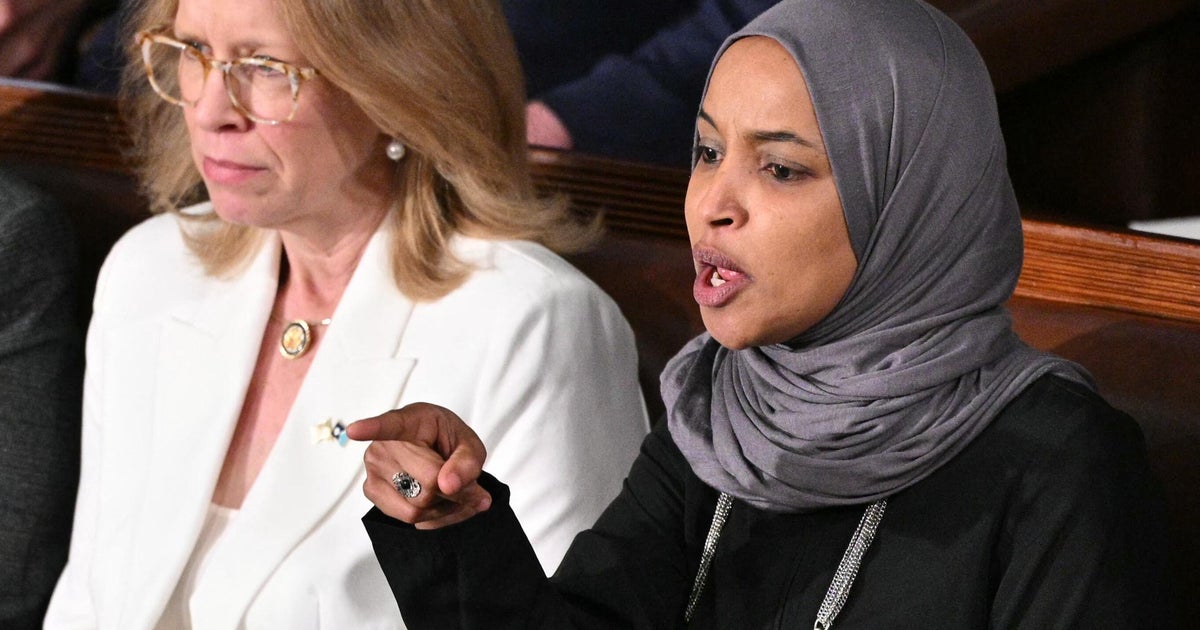Democrats delay vote on anti-Semitism resolution as Rep. Ilhan Omar faces backlash
Washington — Democratic leaders in the House delayed a vote on an anti-Semitism resolution that was drafted in response to comments by freshman Rep. Ilhan Omar, D-Minnesota, facing concerns from their members who wanted to see broader language.
The resolution will be updated to include anti-Muslim bias and other forms of bigotry, likely pushing a vote to Thursday, a day later than they had originally hoped, according to two Democratic aides. House Speaker Nancy Pelosi and Majority Leader Steny Hoyer told Democratic leaders about the change of plans Tuesday evening, one of the aides said.
The resolution had widely been seen as a rebuke of Omar, who has faced backlash for controversial comments about Israel, most recently for saying Israel's "political influence" leads people to "push for allegiance to a foreign country."
Without mentioning Omar by name, the four-page resolution says her comment "suggests that Jews cannot be patriotic Americans and trusted neighbors." She did not answer questions about her comments while leaving her Capitol Hill office Tuesday.
Rep. Ted Lieu, D-California, emerged from a meeting with the Pelosi and Hoyer Tuesday evening and said he expected a new resolution would be drafted to include "other forms of religious bigotry." Majority Whip Jim Clyburn, D-South Carolina, the highest ranking African-American member of the House, said he wanted to see a resolution that was "anti-hate."
Other members who were not in the leadership meeting, including Congressional Progressive Caucus co-chair Pramila Jayapal, D-Washington, said her caucus wanted to see a "broader" resolution that doesn't name any specific person.
"We want it to be as inclusive as possible. I think everyone is on the same page," she said.
The original resolution, a copy of which was provided to CBS News by a Congressional aide, did make reference to other peoples and religions. The authors wrote the claims of dual loyalty have "have an insidious,bigoted history," including the internment of Japanese Americans during World War II and "the post-9/11 conditions faced by Muslim-Americans in the United States, including unfounded, vicious attacks on and threats to Muslim-American Members of Congress."
One member who had worked behind the scenes on the original resolution said Omar's comments were "completely unacceptable."
"As someone who's Jewish, the idea that you question my loyalty to the country as a lawmaker because of my religion is obviously offensive and deeply hurtful," said Democratic Rep. Josh Gottheimer of New Jersey.
Pelosi shares the cover of this month's Rolling Stone with Omar, the nation's first Muslim congresswoman. But the Democratic leader also reprimanded Omar last month for a tweet about a Jewish lobbying group and money.
Omar said she's being held to a double standard. Last week, a poster in the West Virginia state capitol linked her to 9/11.
"We get to be called names and we get to be labeled as hateful. We know what hate looks like. We experience it every single day," she said.
Omar has received continued support from fellow freshman Rep. Alexandria Ocasio-Cortez, who has claimed that other kinds of bigotry are not as widely condemned.
"One of the things that is hurtful about the extent to which reprimand is sought of Ilhan is that no one seeks this level of reprimand when members make statements about Latinx + other communities," Ocasio-Cortez wrote on Twitter.
"I would hope that we can use the resolution as a unifying assertion about our values," she told reporters on Capitol Hill Tuesday evening. "I think it's entirely possible for us to have a great resolution in time."
Rebecca Kaplan, Bo Erickson and Grace Segers contributed reporting.




